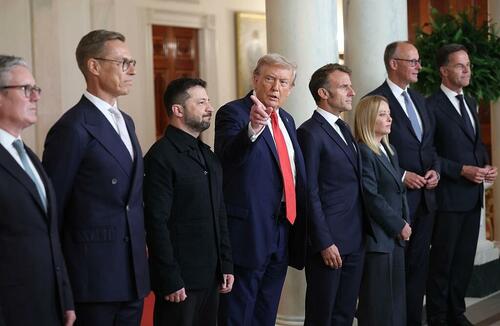The Power Behind The Picture: Why SWIFT, Not Sanctions, May Shape The Ukraine Endgame
Authored by Tanvi Ratna via The Epoch Times,
When European leaders gathered in the Oval Office last week—Macron, von der Leyen, Starmer, Merz—the photo quickly made the rounds. President Trump sat behind the Resolute Desk, flanked by figures from across the Atlantic. The posture, the optics, the framing—it appeared to confirm a familiar narrative: Washington leads, Europe follows.
But the real balance of influence isn’t captured in images. It resides in quieter mechanisms, the systems beneath the surface that increasingly shape negotiations. At the center of that unseen power structure is a little-discussed institution headquartered in Belgium: SWIFT.
In the context of the Ukraine conflict, SWIFT—the Society for Worldwide Interbank Financial Telecommunication—has become a decisive lever.
Though often mistaken as merely a messaging platform, it is now a strategic instrument with capabilities to screen, freeze, and exclude.
And in this war, exclusion from SWIFT has proved more economically consequential than any single battlefield loss.
One case illustrates the stakes clearly: Russia’s Rosselkhozbank.
Obscure to most outside financial circles, Rosselkhozbank plays a pivotal role in Russia’s rural economy.
It finances roughly 15 percent of the country’s agribusiness sector, including fertilizer exports and grain shipments.
Moscow has consistently made its reconnection to SWIFT a condition for extending Black Sea grain deals—highlighting just how critical access is to maintaining even non-military economic flows.
Yet its access remains cut. Without SWIFT, Rosselkhozbank cannot reliably process cross-border payments.
Alternatives such as Russia’s SPFS are limited, flagged for sanctions risk, and avoided even by some of Moscow’s closer partners.
Chinese and Turkish financial institutions have grown wary.
OFAC scrutiny makes participation costly. In practical terms, without SWIFT, Russian exports must navigate workarounds fraught with uncertainty and delay.
Washington has signaled flexibility.
Since the Trump–Putin summit in Alaska, the White House has floated the idea of targeted relief—trial exemptions tied to progress on humanitarian issues, resource trade, or even a ceasefire roadmap. This approach reflects a broader strategy: use selective sanctions relief as leverage, not as concession.
But Europe takes a different view.
At a meeting in Paris earlier this year, EU leaders reaffirmed their stance: no access to SWIFT for any Russian bank until full withdrawal from occupied Ukrainian territory.
The policy is not merely a negotiating tactic—it is treated as foundational.
The European Commission reiterated this position, calling Russia’s withdrawal a “non-negotiable precondition” for financial reintegration.
This divergence is significant. While Washington treats sanctions as a fluid tool, Brussels sees them as a principle. And in the case of SWIFT, it is Brussels that holds the administrative key. Despite American influence, SWIFT operates under EU jurisdiction. Decisions about membership, reconnection, and compliance flow through Belgium, not Washington.
That matters, because the Kremlin sees Rosselkhozbank as more than a bank—it sees it as a wedge. If one entity can be reconnected under humanitarian grounds, the door opens for others. Gazprombank. Sberbank. Each new reconnection becomes a precedent, each exception a potential erosion of the sanctions wall.
It’s not difficult to see the contours of the strategy. Russia ties grain exports to banking access. Ceasefire proposals are linked to transaction routes. By framing financial connectivity as humanitarian necessity, Moscow attempts to turn operational requirements into bargaining leverage.
Yet the transatlantic gap on this issue is real. The Trump administration, wary of indefinite escalation, favors measured flexibility to extract concessions. European institutions, less convinced by Moscow’s signals, remain committed to hard conditionality.
That difference could become more than rhetorical. EU sanctions require unanimous renewal every six months.
Hungary, already an outlier on Ukraine policy, continues to threaten vetoes. Some European capitals fear that if U.S. pressure for flexibility increases, internal EU cohesion may weaken. Quiet voices now warn that sanctions unity is not a given—it is conditional and finite.
That is the paradox.
The United States commands NATO forces, leads diplomacy, and provides the lion’s share of financial aid to Ukraine. But Europe—by controlling access to SWIFT—holds the more durable power over Russia’s economic reentry.
It is, in essence, statecraft by infrastructure. Not force of arms, but force of systems.
This is why the Rosselkhozbank issue, seemingly marginal, carries strategic weight. It tests whether sanctions policy remains intact or begins to splinter under political and economic pressures. It measures whether transatlantic unity is resilient or conditional. And it challenges whether Europe’s commitment to sanctions is compatible with Washington’s push for deal-making.
Trump’s photo with European leaders may dominate headlines, but the decisions that shape the war’s endgame may be happening in conference rooms thousands of miles away—in Brussels, not Washington.
In that quiet divergence lies a deeper contest: over timelines, terms, and tools.
And perhaps, ultimately, over control.
Tyler Durden
Fri, 08/29/2025 – 20:05
Source link


















